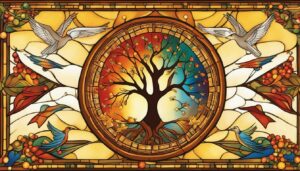The sun is a powerful and ubiquitous symbol across many cultures and religious traditions, including Christianity. In the Bible, the sun is often used as a metaphor to represent various aspects of God and his relationship with humanity. In this article, we will explore the multifaceted symbolism of the sun in the Bible, its interpretations, and its significance to our spiritual lives.
Key Takeaways:
- The sun is a potent symbol in various religious and spiritual traditions
- The Bible uses the sun as a metaphor for God and his relationship with humanity
- The sun has many different interpretations, including representations of power, majesty, guidance, light, and spiritual significance
- Throughout the Bible, the worship of the sun is contrasted with the worship of the one true God
The Power and Majesty of the Sun in Biblical Imagery
In the Bible, the sun is portrayed as a powerful and majestic symbol of God’s strength and sovereignty. In Psalm 19:1, King David writes, “The heavens declare the glory of God; the skies proclaim the work of his hands.” This passage highlights the connection between the sky, the sun, and God’s glory. The sun is often associated with God’s power and might, and its magnificence reflects the splendor of God’s creation.
The Bible also frequently employs the imagery of the rising and setting sun as a symbol of God’s magnificence. In Malachi 4:2, God is described as the “Sun of Righteousness” who will bring healing and salvation to the people. The sun’s warm and life-giving energy is a powerful metaphor for God’s love and grace.
“By his stripes we are healed.” – Isaiah 53:5
Furthermore, the sun’s association with light and illumination is also significant in biblical imagery. In Psalm 119:105, King David writes, “Your word is a lamp for my feet, a light on my path.” The sun is often used as a metaphor for God’s wisdom and truth, guiding believers along the path of righteousness.
The power and majesty of the sun in biblical imagery remind us of God’s sovereignty and the splendor of his creation. We are called to follow the light of God’s word and seek his wisdom in all aspects of our lives.
The Sun as a Symbol of God’s Guidance and Light
In the Bible, the sun is often used as a metaphor for God’s guidance and light. In Psalm 119:105, it says, “Your word is a lamp for my feet, a light on my path.” This passage speaks to the idea that God’s wisdom illuminates a righteous path for us to follow, just as the sun illuminates the world around us.
The book of Malachi also likens the sun to righteousness, saying “But for you who revere my name, the sun of righteousness will rise with healing in its wings” (Malachi 4:2). This passage emphasizes the importance of living a righteous life and the healing power that comes with it, just as the sun’s warmth and light can bring physical healing.
“But to you who fear My name The Sun of Righteousness shall arise With healing in His wings; And you shall go out And grow fat like stall-fed calves.” – Malachi 4:2
Another passage in the Bible where the sun is used as a symbol of God’s guidance and direction is in Isaiah 60:1-3, which says:
“Arise, shine, for your light has come, and the glory of the Lord rises upon you. See, darkness covers the earth and thick darkness is over the peoples, but the Lord rises upon you and his glory appears over you. Nations will come to your light, and kings to the brightness of your dawn.”
This passage encourages us to follow God’s light and to let God’s glory shine through us so that others may be drawn to it. Just as the sun is a source of light that guides us throughout the day, God’s wisdom and truth can guide us through the darkness of life.
The Phenomenon of Sun Worship in Ancient Hebrew Scriptures
Ancient Hebrew culture was no stranger to the worship of celestial bodies, including the sun. There are several references in the Bible to sun worship, which was often associated with various pagan religions and practices. In the book of Deuteronomy, the Israelites were warned against the worship of the sun and other celestial bodies:
“And beware lest you raise your eyes to heaven, and when you see the sun and the moon and the stars, all the host of heaven, you be drawn away and bow down to them and serve them, things that the Lord your God has allotted to all the peoples under the whole heaven.” – Deuteronomy 4:19 (ESV)
The worship of the sun and other celestial bodies was considered a form of idolatry, which was strictly forbidden by God. This is because the worship of false gods and idols detracted from the true worship of God. In the book of Ezekiel, God condemns the Israelites for their practices of sun worship:
“Therefore I will act in wrath. My eye will not spare, nor will I have pity. And though they cry in my ears with a loud voice, I will not hear them.” – Ezekiel 8:18 (ESV)
The above passage describes the judgment that God would bring upon the Israelites for their idolatrous practices, including the worship of the sun. Despite God’s warnings and judgments, the worship of the sun and other celestial bodies persisted in ancient Hebrew culture.
Conclusion
The phenomenon of sun worship in ancient Hebrew scriptures is a reminder of how easily human beings can be drawn to idolatry and false worship. God’s warnings against the worship of the sun and other celestial bodies were not only meant for the Israelites but also serve as a warning to all of humanity. The worship of the true God must always come before any other form of worship.
The Symbolic Significance of the Sun in Christianity
In Christianity, the sun takes on a unique symbolism that is closely linked to the concept of God’s love, grace, and salvation. The physical properties of the sun play an important role in this symbolism, as its warmth and life-giving energy are connected to the spiritual concepts of light and life.
One of the most significant references to the sun in the Bible is found in Malachi 4:2, which describes Jesus as the “Sun of Righteousness” who will rise with healing in his wings. This verse emphasizes the role of Jesus as the source of spiritual light and healing, drawing on the imagery of the rising sun.
Another important aspect of the sun’s symbolism in Christianity is its association with resurrection. Just as the sun rises each day, so too does the promise of new life and renewal. This is reflected in the account of Jesus’ resurrection in the New Testament, where the rising of the sun on the third day marks the beginning of a new era of hope and redemption.
“But for you who fear my name, the sun of righteousness shall rise with healing in its wings. You shall go out leaping like calves from the stall.” – Malachi 4:2
The sun also represents the glory of God in Christianity. The radiance and majesty of the sun are associated with the glory of God and his power and sovereignty. This is reflected in the verse in Psalm 84:11, where it says: “For the Lord God is a sun and shield; the Lord bestows favor and honor. No good thing does he withhold from those who walk uprightly.”
Finally, the sun in Christianity symbolizes the promise of eternal life. In the book of Revelation, it is said that there will be no need for a sun or any other light source, for God himself will be the source of light. This emphasizes the ultimate goal of Christian faith, which is the attainment of eternal life in the presence of God.
The Symbolic Significance of the Sun in Christianity: Conclusion
Overall, the symbolism of the sun in Christianity is rich and multifaceted, encompassing themes of light, life, healing, glory, and eternal life. The physical attributes of the sun offer powerful metaphors for spiritual concepts, making it a potent symbol of God’s love and grace. By exploring the symbolism of the sun in the Bible, we can gain a deeper understanding of the essential beliefs of Christianity and the inspiring message of hope it offers.
The Symbolic Significance of the Sun in Christianity
In Christianity, the sun holds a unique position as a symbol of God’s love, grace, and salvation. Its physical properties, such as warmth and life-giving energy, are connected to spiritual concepts that are central to the Christian faith.
One of the most significant references to the sun in Christianity is found in Malachi 4:2, where it is described as the “Sun of Righteousness” who brings healing and salvation. This verse is often interpreted to refer to Jesus Christ, who is seen as the source of spiritual light that illuminates the darkness of sin and death.
Similarly, Psalm 84:11 describes God as a “sun and shield,” providing both light and protection for his people. This metaphor reinforces the idea that the sun is a symbol of God’s power and sovereignty, as well as his graciousness and care.
The Connection Between the Sun and Spiritual Life
As the source of light and warmth, the sun is also closely associated with spiritual concepts such as life and vitality. In John 8:12, Jesus refers to himself as the “light of the world,” connecting his divine nature to the idea of illumination and the sun’s life-giving properties.
Furthermore, the sun’s daily cycle of rising and setting represents the cycle of life and death, reminding Christians of the cyclical nature of existence and the importance of faith in eternal life.
The Sun as a Symbol of Renewal and Resurrection
Another important aspect of the sun’s symbolism in Christianity is its connection to renewal and resurrection. In the Bible, the rising sun often represents the dawn of a new day and a fresh start. This theme is echoed in the Christian belief in the resurrection of Jesus and the promise of new life after death.
Additionally, the idea of the sun “renewing” itself each day by rising again is seen as a metaphor for the cycle of death and rebirth, reminding Christians of the hope of spiritual renewal and the promise of eternal life through Christ.
Conclusion
Throughout the Bible, the sun is a multifaceted symbol that represents many different aspects of God’s power, grace, and guidance. In Christianity, the sun’s physical properties are closely connected to spiritual concepts such as life, renewal, and resurrection, making it a powerful and meaningful symbol for believers.
As we explore the symbolic significance of the sun in the Bible, we are reminded of the universal nature of spiritual symbolism and the way in which it can connect people across cultures and religions.



